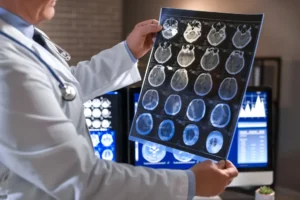
What is a Neurology Consultation?
When you hear “neurology consultation,” think of it as your first friendly chat with a brain and nerve expert. We know that visiting a neurologist might seem a bit scary at first, but we’re here to make the process as clear and simple as possible. Whether your primary care doctor suggested you see a specialist or you decided to reach out on your own, this consultation is the first step toward understanding and managing your symptoms.
Common Signs You Might Need a Neurological Evaluation include symptoms like seizures or movement disorders
- Frequent or Severe Headaches can often be symptoms of an underlying neurological disorder that needs to be addressed.
- Dizziness or Balance Issues may be a sign that you should let your neurologist know.
- Seizures or Sudden Weakness may indicate a serious neurological condition that requires immediate attention.
- Numbness or Tingling Sensations
How to Prepare for Your Neurology Consultation
Gather Your Medical History
- Collect Your Records: Bring along any previous tests, like MRI or CT scans, and reports from past neurological exams. This helps us understand your journey so far.
- Share Past Experiences with any neurological condition you’ve encountered. If you’ve seen other specialists or undergone evaluations before, have those records handy.
Make a List of Your Medications and Symptoms
- Medication Rundown: We will discuss your current medications during your neurologist appointment to ensure they are effective for your condition. Write down all your current medications including over-the-counter drugs and supplements so we can see if any might be affecting your symptoms.
- Keep a Symptom Diary: Note when your symptoms occur, how long they last, and how severe they are, as this information is crucial for your neurologist consultation and will aid in your diagnosis and treatment. This helps us spot patterns and better understand your condition, which is essential for your diagnosis and treatment.
Prepare Your Questions
- Write It Down: Think about what you’d like to know. Questions like, “What might be causing my symptoms?” or “What tests will I need?” can be really helpful.
- Be Open: It’s important to be open about your symptoms during your appointment with a neurologist. We want to know everything that’s on your mind so we can give you the best care possible.

What Happens During Your Neurological Exam?
A Friendly, Hands-On Assessment
- Simple Tasks: We’ll ask you to perform easy tasks like walking a short distance, touching your nose with your finger, or following a moving object with your eyes to help us diagnose any potential issues. These help us check your balance, coordination, and how well your brain and nerves work together.
- Quick Tests: We might gently tap your reflexes with a small hammer or ask you to squeeze your hand to check your muscle strength during a neurological examination. These tests are simple and designed to show us how your nervous system is functioning.
A Conversation About Your Symptoms
- Sharing Your Story: We’ll talk about when your symptoms started, how often they occur, and what makes them better or worse. This chat helps us get a clear picture of your health and aids in the process to diagnose any potential neurological issues.
- Listening Closely: Your input is essential. We’re here to listen to every detail you share about your neurological disorder, ensuring we understand your unique experience.
A Personalized Approach
- Tailored Testing: Depending on your symptoms, we might perform specific checks to focus on areas of concern. This could include brief tests of your memory or language skills if needed.
- Step-by-Step Guidance is essential for understanding the process of diagnosing your neurological disorder. Throughout the exam, we’ll explain each test in simple language so you know exactly what’s happening and how we will diagnose and treat your condition.
What Diagnostic Tests Might Be Order?
Common Tests We May Use
- Neuroimaging Studies:
- MRI & CT Scans: These tests create detailed images of your brain and spinal cord, assisting neurologists in diagnosing potential diseases of the brain. They help us spot any structural changes, injuries from auto accidents, or signs of inflammation in the brain’s blood vessels.
- Electrodiagnostic Tests:
- EEG: This test may be recommended during your appointment with a neurologist to assess brain activity. This test measures your brain’s electrical activity, which is crucial for an accurate diagnosis. It’s useful for checking for seizure disorders or other issues related to brain function and blood vessels.
- EMG & Evoked Potentials: These tests look at how well your muscles and nerves work together, helping us understand any unusual sensations or muscle weakness.
- Blood Tests and Lab Work:
- We might also run some blood tests during your neurologist consultation to rule out infections or metabolic problems that could be affecting your nervous system. Sometimes, a lumbar puncture (spinal tap) is needed to analyze the fluid around your brain and spinal cord.
Why These Tests Matter
What Happens After Your First Appointment?
Crafting a Personalized Treatment Plan
- Tailored Just for You: We use everything we learn from your exam and tests to create a treatment plan that fits your unique needs. Whether it’s medications, lifestyle adjustments, or other therapies, every step is designed to treat and manage your neurological diseases with you in mind.
- Clear Explanations: We take the time to explain each option so you feel confident and informed about your health information and care provided by your healthcare provider.
Discussing Your Options and What Lies Ahead
- Exploring Treatments Together: We’ll review all potential treatments and discuss what might work best for your specific situation. If you have questions or need a second opinion, we’re here to talk it through.
- Understanding Your Prognosis: It’s essential to discuss your health information with your neurologist to understand your condition better. We share honest insights about what you can expect during your neurology appointment, helping you feel prepared for your recovery journey.
Ongoing Support and Follow-Up Care
- Regular Check-Ins: Your health is important to us. We’ll schedule follow-up visits to monitor your progress and adjust your treatment plan as needed, as a neurologist will probably recommend.
- Continued Guidance: After your neurology appointment, we will provide ongoing support to help you navigate your diagnosis and treatment options treated by a neurologist. As your symptoms change, we remain by your side, ensuring you receive consistent, supportive care every step of the way.

Wrapping Up Your Journey to Better Neurological Health
- Your Health, Your Future: a partnership with your neurologist as soon as possible is essential for long-term wellness. We work closely with you to create a treatment plan that fits your unique needs, ensuring you feel confident every step of the way during your neurologist appointment.
- Friendly, Personalized Care: Our team is dedicated to providing a warm, accessible environment where your questions are answered and your concerns are heard.
- Ongoing Support: Your recovery is a journey, and we’re with you for the long haul with regular follow-ups and tailored adjustments to your care plan.
Read All Articles
Lorem ipsum dolor sit amet, consectetur adipiscing elit. Ut elit tellus, luctus nec ullamcorper mattis, pulvinar dapibus leo.
What to Expect During a Virtual Neurology Consultation As the...
Read MoreHow Online Neurologists Provide Legal Reports for Injury Claims
How Online Neurologists Provide Legal Reports for Injury Claims Neurologists are...
Read MoreBenefits of Virtual Neurology Consultations for Injury Victims
Benefits of Virtual Neurology Consultations for Injury Victims When someone...
Read MoreSymptoms That Require a Neurology Consultation After an Auto Accident
Symptoms That Require a Neurology Consultation After an Auto Accident...
Read More


